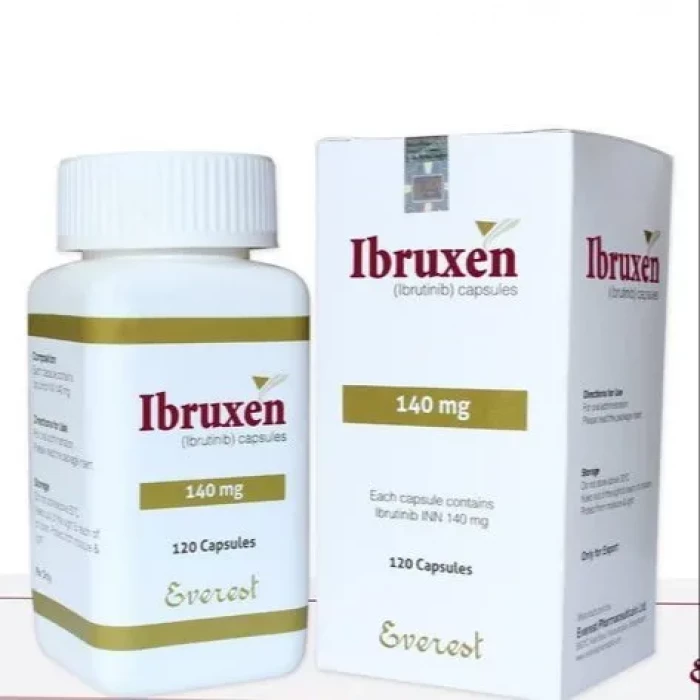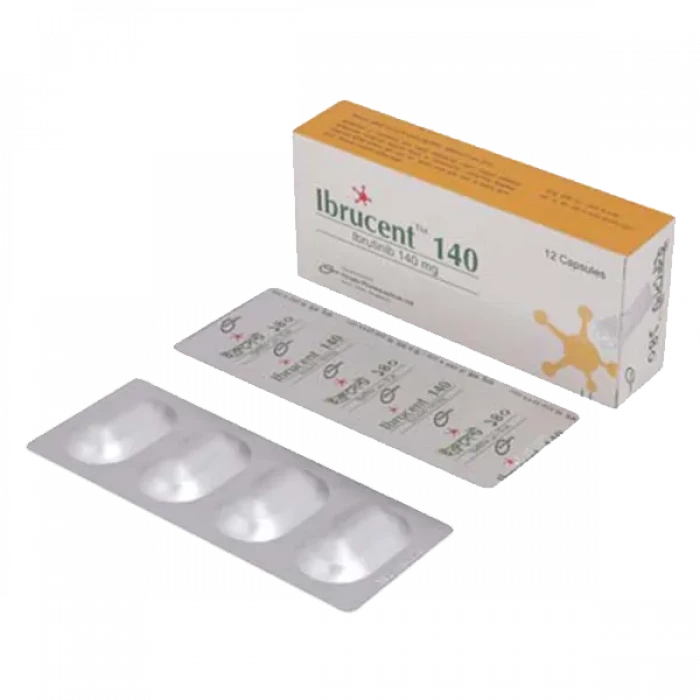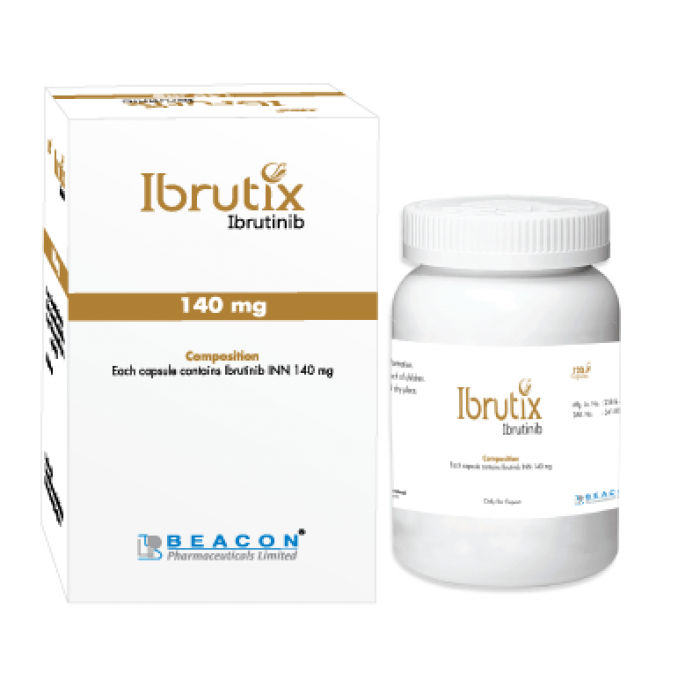
✔ 100% Authentic Product
👁️ Currently Viewing 3018
Ibruxen (Ibrutinib), a generic version of Imbruvica, is a prescribed medication for treating specific cancers like Mantle Cell Lymphoma (MCL), Chronic Lymphocytic Leukemia (CLL)/Small Lymphocytic Lymphoma, and Marginal Zone Lymphoma (MZL). It's also used to address conditions such as Waldenstrom Macroglobulinemia and Chronic Graft-Versus-Host Disease (cGVHD). Ibruxen is manufactured by Everest Pharma Ltd. in Bangladesh.
Discount
Price: ৳ 150,480
MRP:
৳
158400
5%
Off

100% Genuine Products, Guaranteed

Safe & Secure Payments, Always

Fast, Secure & Efficient Delivery

Proper Packaging
 Cash on Delivery - All over Bangladesh
Cash on Delivery - All over Bangladesh Regular Delivery - 12-24 Hours, Dhaka City* Charge Tk.39-59
Regular Delivery - 12-24 Hours, Dhaka City* Charge Tk.39-59 Regular Delivery - 24-48 Hours, Other Cities* Charge Tk.99-110
Regular Delivery - 24-48 Hours, Other Cities* Charge Tk.99-110
🌙 রমযান অফার 🌙
 ফ্রি ডেলিভারিঃ - ৭৯৯ টাকা+ অর্ডারে, ঢাকা
শহরে
ফ্রি ডেলিভারিঃ - ৭৯৯ টাকা+ অর্ডারে, ঢাকা
শহরে ফ্রি ডেলিভারিঃ - ২৭৯৯ টাকা+ অর্ডারে, ঢাকার
বাহিরে
ফ্রি ডেলিভারিঃ - ২৭৯৯ টাকা+ অর্ডারে, ঢাকার
বাহিরে
📲 মোবাইল অ্যাপ অর্ডারে সাশ্রয় বেশী
-
Google Play Store থেকে ডাউনলোড
-
Apple Store থেকে ডাউনলোড
100% Genuine Products, Guaranteed
Safe & Secure Payments, Always
Fast, Secure & Efficient Delivery
Proper Packaging
 Cash on Delivery - All over Bangladesh
Cash on Delivery - All over Bangladesh Regular Delivery - 12-24 Hours, Dhaka City* Charge Tk.39-59
Regular Delivery - 12-24 Hours, Dhaka City* Charge Tk.39-59 Regular Delivery - 24-48 Hours, Other Cities* Charge Tk.99-110
Regular Delivery - 24-48 Hours, Other Cities* Charge Tk.99-110 ফ্রি ডেলিভারিঃ - ৭৯৯ টাকা+ অর্ডারে, ঢাকা
শহরে
ফ্রি ডেলিভারিঃ - ৭৯৯ টাকা+ অর্ডারে, ঢাকা
শহরে ফ্রি ডেলিভারিঃ - ২৭৯৯ টাকা+ অর্ডারে, ঢাকার
বাহিরে
ফ্রি ডেলিভারিঃ - ২৭৯৯ টাকা+ অর্ডারে, ঢাকার
বাহিরে- Google Play Store থেকে ডাউনলোড
- Apple Store থেকে ডাউনলোড
🌙 রমযান অফার 🌙
📲 মোবাইল অ্যাপ অর্ডারে সাশ্রয় বেশী
✅ Description:
Ibrutinib is a targeted cancer therapy used to treat various conditions, including:
- Mantle Cell Lymphoma (MCL) in patients who have received prior therapy.
- Chronic Lymphocytic Leukemia/Small Lymphocytic Lymphoma (CLL/SLL) with or without 17p deletion.
- Waldenstrom Macroglobulinemia (WM).
- Marginal Zone Lymphoma (MZL) requires systemic therapy after previous anti-CD20-based treatment.
Safety Advices

Alcohol
UNSAFE
There is limited information on the interaction of Ibruxen 140mg Capsules with alcohol. Please discuss with your doctor regarding the consumption of alcohol with Ibruxen 140mg Capsule

Pregnancy
UNSAFE
There is limited information available about the safety of Ibruxen 140mg Capsule in pregnant women. Thus, to avoid any risks to the developing baby, Ibruxen 140mg Capsule is not recommended for use in pregnancy.

Breastfeeding
UNSAFE
No information is available if Ibruxen 140mg Capsule passes into human breast milk. It is recommended that breastfeeding women should not use this medicine.

Driving
CAUTION
Ibruxen 140mg Capsule may have a minor effect on driving ability. After taking this medicine, if you experience dizziness or weakness, then it is suggested that you do not drive.

Kidney
CONSULT YOUR DOCTOR
Ibruxen140mg Capsule should be used with caution in patients with kidney diseases due to the increased risk of worsening the patient's condition. Close monitoring of kidney function, appropriate dose adjustments, or replacement with a suitable alternative may be required in some cases based on the clinical condition.

Liver
CAUTION
Ibruxen140mg Capsule should be used with caution in patients suffering from liver diseases due to the increased risk of worsening the patient's condition. Close monitoring of liver function is necessary while receiving this medicine. Appropriate dose adjustments or replacement with a suitable alternative may be required in some cases based on the clinical condition.
✔️ Uses:
- Mantle-cell lymphoma
- Blood cancer (Chronic lymphocytic leukemia)
✔️ How does Ibruxen 140mg Capsule work?
It works by inhibiting the activity of BTK, a signaling molecule crucial for B-cell function, leading to decreased cancer cell proliferation and survival.
✔️ Side Effects of Ibruxen 140mg Capsule
Adverse reactions include bleeding, infections, cytopenias, atrial fibrillation, hypertension, second primary malignancies, tumor lysis syndrome, diarrhea, and visual disturbances.
✔️ Quick Suggestions:
- Take Ibruxen140mg Capsule at the same time every day, either with or without food.
- It is advisable to stay hydrated and drink plenty of fluids while taking this medication.
- Do not skip any dose and complete the course as suggested by your doctor
- Use an effective method of birth control to avoid pregnancy while taking this medication.
- Your doctor may get regular blood tests done to monitor your liver function and blood cell count in your blood.
✔️ Indication
- Chronic Lymphocytic Leukemia
This medicine is used in the treatment of chronic lymphocytic leukemia, a type of blood cancer that affects white blood cells called lymphocytes.
- Mantle Cell Lymphoma
This medicine is used to treat mantle cell lymphoma (a type of cancer that affects the lymph nodes) in patients who have not adequately responded to the previous therapy.
- Waldenstrom's Macroglobulinemia
This medicine is used to treat Waldenstrom's macroglobulinemia (a type of cancer that starts in certain white blood cells called lymphocytes in the bone marrow) in patients who have not adequately responded to the previous therapy.
- Marginal Zone Lymphoma
This medicine is used to treat marginal zone lymphoma in patients who have received therapy with a certain type of chemotherapy medication.
- Chronic graft-versus-host disease (cGVHD)
This medicine is used to treat chronic graft-versus-host disease (cGVHD) in patients who have not adequately responded to one or more lines of systemic therapy.
✔️ Pharmacology
Ibrutinib functions as a small-molecule inhibitor of BTK. By forming a covalent bond with a cysteine residue in the BTK active site, it effectively suppresses BTK enzymatic activity. BTK plays a vital role in the signaling pathways of the B-cell antigen receptor (BCR) and cytokine receptors. Its role in signaling through B-cell surface receptors leads to the activation of pathways essential for B-cell trafficking, chemotaxis, and adhesion. Preclinical studies indicate that ibrutinib hampers malignant B-cell proliferation and survival both in vivo and in vitro, along with curtailing cell migration and substrate adhesion.
✔️ Dosage & Administration of Ibruxen 140mg Capsule
Dosage recommendations for Ibrutinib are as follows:
Mantle Cell Lymphoma and Marginal Zone Lymphoma: The recommended dose for MCL and MZL is 560 mg (four 140 mg capsules) taken orally once daily. This regimen should continue until disease progression or unacceptable levels of toxicity.
Chronic Lymphocytic Leukemia/Small Lymphocytic Lymphoma and Waldenstrom Macroglobulinemia (WM): For CLL/SLL and WM, the recommended dose is 420 mg (three 140 mg capsules) taken orally once daily. This dosing schedule should be maintained until disease progression or unacceptable toxicity. In the case of CLL/SLL, when used in conjunction with bendamustine and rituximab, the prescribed dose is also 420 mg (three 140 mg capsules) orally once daily. This combination treatment should follow a 28-day cycle for up to 6 cycles, or as directed by a healthcare professional.
- Administer orally at the same time each day. Swallow capsules whole with water, avoiding opening or chewing.
Special Populations:
- Pediatric use not established.
- Geriatric: No overall effectiveness differences; monitor for adverse effects.
- Hepatic Impairment: Monitor for toxicity; not recommended in moderate/severe hepatic impairment.
✔️ Interaction
Interactions with Other Medicines, Foods, and Drinks: Cancer medications like ibrutinib can interact with other medications and herbal products. It's important to inform your doctor or pharmacist about all the medications you are currently taking, including vitamins, herbal supplements, and over-the-counter remedies.
- Avoid consuming grapefruit or Seville oranges (bitter oranges) while taking ibrutinib. This includes eating them, drinking the juice, or using supplements containing them, as they can increase the levels of ibrutinib in your bloodstream.
- Taking fish oil, vitamin E, or flaxseed supplements may heighten your risk of bleeding.
- Lactose Intolerance: Ibrutinib contains lactose (milk sugar). If you have lactose intolerance, consult your doctor before taking this medication.
- Fertility Concerns: The impact of this treatment on fertility is unknown. If you're considering having children in the future, discuss your fertility concerns with your doctor before starting treatment.
- Contraception and Pregnancy: This medication can harm a developing fetus. It's crucial not to become pregnant or impregnate someone while undergoing treatment and for at least 3 months afterward. Consult your doctor or nurse about effective contraception before starting treatment, and inform them immediately if pregnancy occurs during treatment.
- Breastfeeding: Do not breastfeed while on this treatment, as the drug may pass into breast milk.
- Informing Other Healthcare Providers: Always inform other healthcare professionals, such as doctors, nurses, pharmacists, or dentists, that you are undergoing this treatment. This information is important if you require treatment for any other conditions, including dental issues.
- Immunizations: Avoid receiving live vaccines during treatment and for up to 12 months afterward, depending on your specific treatment plan. Live vaccines include rubella, mumps, measles, BCG, yellow fever, and certain shingles vaccines like Zostavax. However, you can receive other types of vaccines, though they might offer reduced protection. The flu vaccine (injection) and the COVID-19 vaccine can also be administered, but it's advisable to discuss the timing with your doctor or pharmacist considering your cancer treatment.
✔️ Contraindications
Hypersensitivity to the active substance or excipients.
✔️ Pregnancy & Lactation
- Can cause fetal harm; and risk to the fetus. Background risk unknown.
- Unknown effects on breastfeeding.
✔️ Precautions & Warnings
Talk to your doctor if
- You have had unusual bruising or bleeding or take any medicines or supplements that increase your risk of bleeding (warfarin).
- You have or had an irregular heartbeat, heart failure, or symptoms like weakness, dizziness, fainting, or swollen legs.
- You have liver or kidney problems.
- You have high blood pressure.
- You have recently had or are scheduled for surgery.
- You develop symptoms like trouble thinking, difficulty walking, vision disturbances, weakness in the limbs, headache, and trouble speaking after taking this medicine.
- You experience pain in the upper left belly, pain below the left rib, and pain at the tip of your left shoulder after stopping this medicine.
- You develop symptoms of an infection like fever, chills, body pain, tiredness, and yellowing of the skin or eyes.
✔️ Storage Conditions
Store below 30°C, protect from light and keep out of children's reach.
⚠️Disclaimer:
At ePharma, we’re committed to providing accurate and accessible health information. However, all content is intended for informational purposes only and should not replace medical advice from a qualified physician. Please consult your healthcare provider for personalized guidance. We aim to support, not substitute, the doctor-patient relationship.








